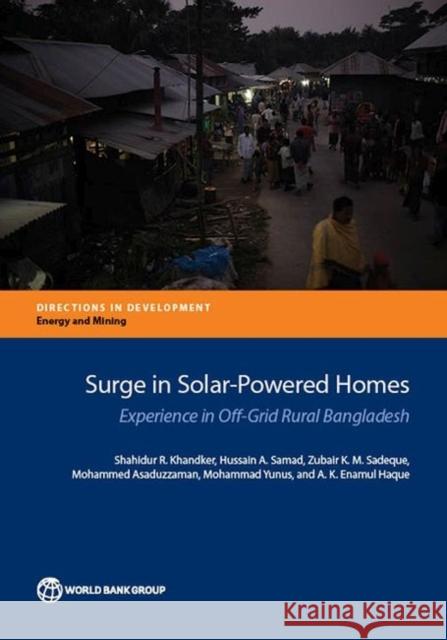Surge in Solar-Powered Homes: Experience in Off-Grid Rural Bangladesh » książka
Surge in Solar-Powered Homes: Experience in Off-Grid Rural Bangladesh
ISBN-13: 9781464803741 / Angielski / Miękka / 2014 / 130 str.
Bangladesh has the world's fastest growing, off-grid solar home system (SHS) coverage. The number of SHS installations has risen phenomenally--from a five-year target of 50,000 in 2003 to 50,000 a month a decade later. By early 2014, installations totaled more than 3 million. Even so, this figure represents just 10 percent of the country's off-grid households, suggesting ample room for continued program expansion. Surge in Solar-Powered Homes: Experience in Off-Grid Rural Bangladesh assesses the country's remarkable growth in SHS, its support schemes, and welfare impacts for rural households. Drawing on both large-scale household survey and institutional data, the book's authors examine the effectiveness of SHS technology in improving rural people's quality of life and the program delivery and financing mechanisms, including partial subsidies, currently in place, administered by the Infrastructure Development Company Limited (IDCOL). The book's findings clearly demonstrate that the welfare benefits of SHS adoption far outweigh the social cost of the subsidy. The benefits of lighting alone--replacing polluting kerosene lamps with solar-powered electric lighting--result in significant cost savings and income gains for adopter households. The findings confirm that SHS increases children's study time, households' sense of security, and women's empowerment. Within the current market incentive structure, there is tremendous scope for broadening the rural market reach. But the high upfront cost of purchasing a SHS at current market prices is a barrier to future sales, suggesting the continued need for IDCOL's well-targeted subsidized operation. Bangladesh's highly successful SHS program leveraged a unique combination of geographical, institutional, and socioeconomic factors; however, certain elements could be easily replicated elsewhere. This book will be of interest to policy makers struggling with the task of increasing rural people's access to electricity, particularly in poor or remote areas where national grid extension is uneconomical. Development practitioners can also benefit from learning about the welfare impacts of SHS on rural households and market-based implementation models designed to meet rural households' basic electricity needs.











